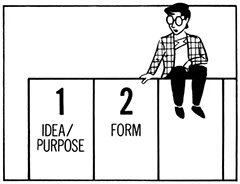
Scott Frank and Jodie Foster, 1991
#17 of 28 in the 20th century series
1991 was the year I started watching a lot of movies in theaters—or perhaps I should say it was the year I started watching movies in theaters a lot. I’d finish my afternoon classes, head over to the California 3 on Kittredge, plunk down my four dollars, and take in a motion picture. Usually this one. I think I saw it six times—twice with friends and four times by myself. Why? Well, 1991 was also the year that I watched Taxi Driver twenty‑two times. Now Jodie Foster was all grown up and making her directorial debut, and obviously I wasn’t going to miss that. And then it turned out that the movie she made was about a child prodigy being raised by a working-class mother without much in the way of education, and gadzooks. I mean, Taxi Driver was all well and good, but here was a movie I could really relate to.
Though in saying that I only mean the initial premise, not the plot that springs from it. The movie is actually about the tug-of-war that develops between Dede, the single mom mentioned above, and Jane, a former prodigy in her own right who now runs an institute for gifted children. This makes for a pretty straightforward Hegelian dialectic: Dede is loving, but her household is a bit too chaotic, and her insistence on keeping her son Fred in a normal school has left him an intellectually stifled, friendless outcast. Jane genuinely cares for Fred, and offers him intellectual challenges and the opportunity to make friends among his actual peers, but her household is a bit too orderly, and she is well-meaning but utterly clueless when it comes to his emotional needs. Dede is pretty obnoxious at the beginning, and Jane becomes a bit of a martinet in the lead-up to the resolution, but neither is a villain, and now that I am no longer a child (as I still legally was when I watched this movie six times), I found that I actually related more to Jane than to Fred. Not only did she not make as much of herself as she might have hoped, but now she’s trying to teach, and has to grapple with the realities of that profession. One thing the movie gets right is recognizing that the ability to do amazingly quick mental calculations or to fluently speak backwards doesn’t actually make a kid any more mature, and gifted seven-year-olds are going to jump on beds and run around shrieking just like any other seven-year-olds. Jane seems to think that just because her hand-picked students have the ability to learn the material she has to teach, they will actually sit attentively and do so, rather than play-wrestle or chase each other around. Silly Jane! That’s not how it works!

John MacDonald, James Webb, Wesley Strick, and Martin Scorsese, 1991
#18 of 28 in the 20th century series
This one I watched in the theaters four times. Why? Again, this was the year I watched Taxi Driver twenty-two times, and this was the first Martin Scorsese film to come out afterward. And it even had Robert De Niro in it! But even at the time, I probably wouldn’t have spent four and sometimes even seven dollars multiple times if the film had nothing going for it in its own right. As it happens, it has at least four things going for it:

This is what Scott McCloud in Understanding Comics would call a Step Two work: it’s much more about form than content. Contemporary reviews summed up the film by saying that it was Scorsese doing Hitchcock, and it is in fact an interesting showcase of weird camera angles, negative images, and other unusual cinematic choices, such as when DeNiro’s bad guy is released from prison and swaggers from the background up toward the camera until his face actually crashes into it.
Hitchcock did genre pieces—suspense films, psychological thrillers—and that’s what we have here. Specifically, though this is actually a remake of a movie from 1962, the ’91 Cape Fear is an entry in the “____ from hell” genre that was popular at the time: mistress from hell, nanny from hell, roommate from hell, and in this case, a lawyer takes on the client from hell. Specifically, back in ’77 the lawyer, Sam Bowden, then a public defender, got assigned the case of Max Cady, a serial rapist and vicious batterer of teenage girls, and when he received a report that the victim in this case was known to be promiscuous—which in the South in the 1970s would almost certainly get Cady off the hook —Bowden hid the report. It’s an interesting conundrum that reminded me of the novel A Naked Singularity, in which a public defender is furious that, although he’s found a technicality which should get his client acquitted, the judge is railroading the case toward a guilty verdict, and it’s easy to be furious right along with the lawyer, if you don’t mind the fact that his client actually did steal stuff. In Cape Fear, Cady is guilty of a far worse crime, and doesn’t even have the letter of the law on his side, just the prejudices of a pathologically misogynistic society. Still, one could argue that the one person who shouldn’t be deciding that he’s better off in jail is his own attorney—that way lies a justice system even more rigged than the one we have. In any case, the illiterate Cady has plenty of time in prison to learn to read, study up on his case, and discover what Bowden has done. He vows revenge, and hence the movie. The gimmick is that Cady is clever enough to launch a series of horrific attacks against Bowden and those close to him, yet do it in such a way that Bowden is the one who finds himself in deeper and deeper trouble. Manipulating Bowden’s daughter, setting Bowden up for disbarment, strapping himself to the underside of the Bowdens’ car when they try to flee—it was interesting to listen to different audiences react as Cady’s schemes unfolded.
Then of course you had De Niro’s scenery-chewing performance as Max Cady, a memorable movie monster with a preposterous redneck accent and some amusing lines—my best male friend from high school, Greg West, was fond of the bit in which Bowden is attempting to beat Cady to death and Cady replies, “Ferget about that restrainin’ order, counselor? You are well within five hundred yards!” At the time, probably the most notice went to his many tattoos, a sign of how times have changed: in 1991 Cady’s tattoos were considered ludicrous, but he actually has fewer on his entire body than a lot of today’s celebrities have on one arm.
Finally, you had the real killer performance in Cape Fear, that of the teenage Danielle Bowden by a then-unknown Juliette Lewis. (Well, not entirely unknown—I’d seen her on The Wonder Years.) Drawling as a verbal eye-roll, nervously giggling, awkwardly flouncing in and out of rooms, this was acting that seemed realistic in a way I hadn’t seen before. This time around her performance no longer seemed like such an outlier, but I was still impressed—way more than I was by Jodie Foster in Taxi Driver.
Normally this would be the part in which I say that despite all of the criticisms in my article, I didn’t hate the film. Instead, I have to say that while the above might seem laudatory, all of the above pluses come in the service of what is ultimately a dressed-up slasher fic, which made for a fairly unpleasant time. I will probably score it as my equivalent of what Mike D’Angelo calls “on the fence, leaning forward”. Better than strictly neutral. Miles short of the pantheon.
 |
 |
 |
 |
||
|---|---|---|---|---|---|
Tumblr |
this site |
Calendar page |
|||